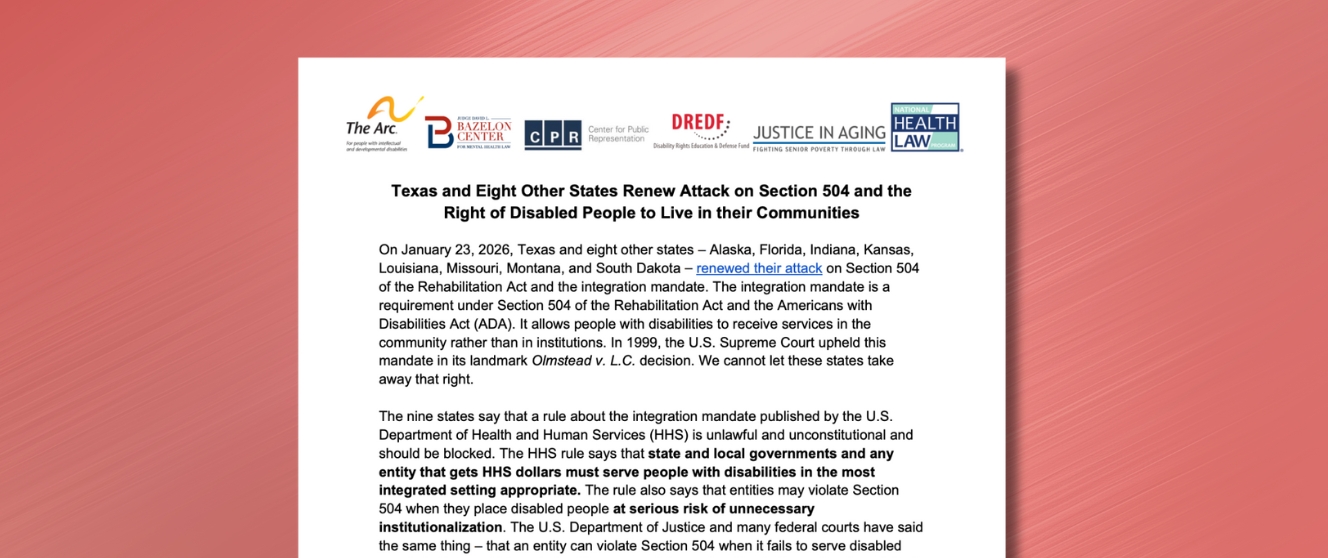
FOR IMMEDIATE RELEASE
November 22, 2023
AUSTIN, TEXAS — Disability Rights Education and Defense Fund (DREDF), Women Enabled International, and the Texas Civil Rights Project (TCRP) have filed an amicus brief on behalf of eleven disability rights organizations and scholars in the Texas Supreme Court, urging a fair interpretation of the medical exception to the state’s abortion ban. The brief highlights the disproportionate impact of the ban on individuals with disabilities, who are more likely to rely on medical exceptions than non-disabled individuals. View the amicus brief here.
The amicus brief emphasizes the urgent need to consider the rights and well-being of people with disabilities in the ongoing legal battle surrounding Texas’ abortion restrictions. By restricting access to abortion, these bans place an undue burden on individuals with disabilities, who often require specialized medical care and may face additional challenges in carrying a pregnancy to term.
The amicus brief underscores the importance of protecting the rights of individuals with disabilities and ensuring their equal access to reproductive healthcare. It urges the Texas Supreme Court to consider the unique circumstances faced by this vulnerable population and to interpret the medical exception to the abortion ban in a manner that upholds their rights and safeguards their well-being.
The following statements are from the organizations who filed the amicus brief:
“Reproductive and bodily autonomy is critical to the lives of people with disabilities,” said Jillian MacLeod (she/her), Reproductive Justice Legal Fellow at the Disability Rights Education and Defense Fund. “It is not acceptable to require people with disabilities to carry potentially life-threatening pregnancies to term. The medical exceptions must be made clear to protect the lives of disabled Texans.”
“There can be no disability justice without reproductive justice in Texas. People with disabilities are just as likely to become pregnant, but have a much higher risk for severe pregnancy- and birth-related complications and maternal mortality,” said Amanda Spriggs Reid (she/her), Equal Justice Works Fellow at Women Enabled International. “The Texas Constitution provides both equal protection and a right to life and the status of pregnancy does not strip a person with disabilities of those constitutional rights. Clarification of the medical exceptions is critical so healthcare providers can perform medically necessary abortions without penalty.”
“Texans have a right to make decisions about their reproductive health, including the decision to have an abortion,” said Rochelle Garza (she/her), President of the Texas Civil Rights Project. “This ban is not just about abortion, it perpetuates discrimination against the most vulnerable, especially individuals with disabilities and those experiencing poverty, who already face significant barriers in getting access to the healthcare they need.”
“The Texas abortion ban’s confusing, narrow and inconsistent restrictions deter physicians from providing medically necessary abortion care, putting people with disabilities at risk,” said Dustin Rynders (he/him), Director of the Criminal Injustice Program at the Texas Civil Rights Project. “It is crucial that the Texas Supreme Court take action so that patients with disabilities and their doctors can make decisions about medically necessary reproductive healthcare without fear.”
To schedule an interview regarding the amicus brief filing, please reach out to the respective organization’s media contact.
Contact:
Texas Civil Rights Project, media@texascivilrightsproject.org
Disability Rights Education and Defense Fund, tpinedo@dredf.org
Women Enabled International, a.spriggs@womenenabled.org
###
About Texas Civil Rights Project
The Texas Civil Rights Project is boldly serving the movement for equality and justice in and out of the courts. We use our tools of litigation and legal advocacy to protect and advance the civil rights of everyone in Texas, and we partner with communities across the state to serve the rising movement for social justice. We undertake our work with a vision of a Texas in which all communities can thrive with dignity, justice and without fear.
About Disability Rights Education and Defense Fund
Disability Rights Education and Defense Fund (DREDF) is a leading national civil rights law and policy center directed by individuals with disabilities and parents who have children with disabilities. Founded in 1979, DREDF works to advance the civil and human rights of people with disabilities through legal advocacy, training, education, and public policy and legislative development.
About Women Enabled International
Women Enabled International (WEI) advances human rights and justice at the intersection of gender and disability to challenge exclusionary, unjust systems and support the leadership and center the voices of women, girls, and gender-diverse people with disabilities globally. WEI pioneered the application of an intersectional gender and disability framework to international human rights advocacy and has effectively worked to amplify the voices of women and gender-diverse people with disabilities in spaces where their rights are discussed and where decisions affecting their lives are made.

